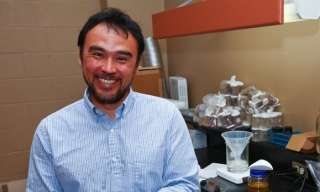Researchers lead national agricultural biosolids project

One of the ongoing concerns of municipalities everywhere is how best to treat and manage wastewater and wastewater solids. Many have chosen to treat biosolids in a process called alkaline stabilization, which involves addition of quicklime to raise pH levels to make them less acidic, and then pass them on for use as agricultural liming amendment.
This option is not without controversy, however, which is why Dalhousie researcher Gordon Price and his team are leading a national research project seeking to answer important questions about this process.
"There are a lot of unanswered questions about the safety and effectiveness of using biosolids from the municipal wastewater treatment system in agriculture: how do organic chemicals break down and change as they move through the system?" says Dr. Price, the Innovative Waste Management Research Chair in the Faculty of Agriculture's Department of Engineering. "My project is trying to get some answers for regulators and for end users."
Risks and benefits
The alkaline stabilization process that Halifax and some other municipalities use to treat wastewater solids not only sterilizes them but also helps to improve the pH of the soil the biosolids are mixed with. This change is particularly helpful in Nova Scotia, which has predominantly acidic soil that needs intervention in order to be agriculturally productive.
But the risks of using biosolids as a soil amendment are less clear, and broader system-based studies are needed to help further our understanding. While there is plenty of research about the effects of heavy metals in soil on human health, the possible ecological and health impacts of organic chemicals associated with biosolids has not been studied to the same degree. Organic chemicals can include ingredients from prescription drugs to personal care products, such as soaps and shampoos.
Dr. Price has set up a long-term research project to study how the organic chemicals in biosolids move through an ecosystem, going from the soil to water, to plants and how they affect the organisms, like earthworms, that live in the soil.
The tools to identify chemicals and their concentrations were purchased using funding from the Nova Scotia Research and Innovation Trust and the Canada Foundation for Innovation. "The instrumentation that we purchased with the NSRIT grant has really made this work possible and has facilitated Dalhousie leading this national project."
Researchers at four other universities, as well as government and private partners, are also collaborating on this important project. Learn more about Dr. Price's project.
Provided by Dalhousie University